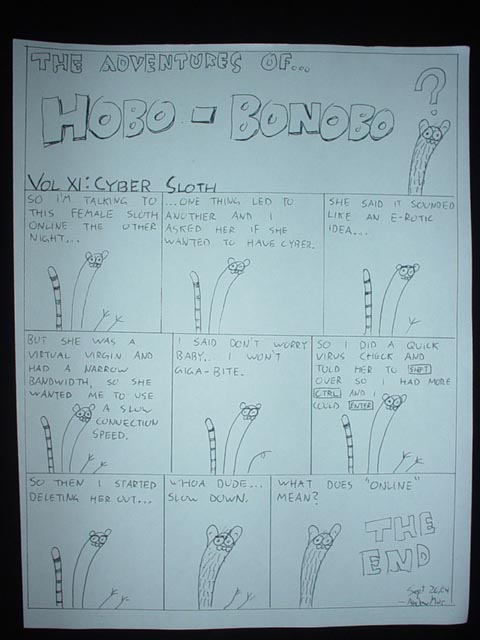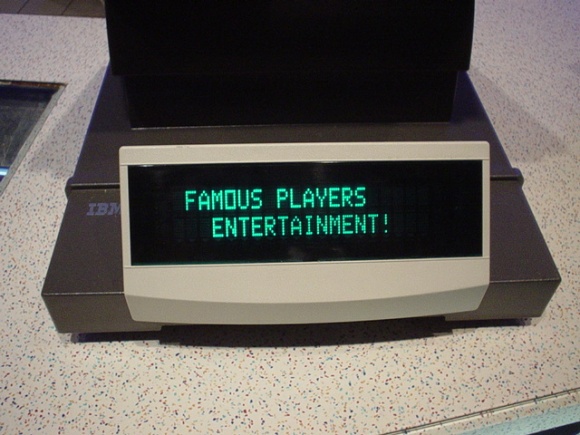A cautionary note to my readers: if you have not worked at Silvercity Mission, this entry might not interest you. If, however, you have had the pleasure, then another cautionary note: this will be a long nostalgic entry. Now that I’m officially finished there, I can finally write a retrospective. I worked there for 3 years, so forgive me if it is long.
I want to put the whole experience into context. While I was away, I had a lot of time to think, and I often reflected on my Silvercity experience with a sharply contrasting mixture of fondness and disdain. It’s all too often the case with minimum-wage jobs… you love them because they’re easy and they’re fun, but you hate them at the same time because they’re sometimes very demeaning. Did you know that in three years of employment my raise was only increased by a grand total of $0.50? And that’s after being promoted to a supervisor and being crossed trained as a projectionist. I don’t want to get too much into specifics, but I think this aptly demonstrates how truly ‘low-level’ my employment status has been for the last 3 years. In fact, I’ve had 5 jobs and Silvercity was still the lowest paying job I’ve ever had.
Now that it’s all over, I’d like to use this blog to summarize the experience, as best as can be done in a few paragraphs and photos. Of course, I can never do justice to all that has happened… partly because I don’t remember a lot of it now. So many people have come and gone, it’s hard for me to remember the names and faces I worked with when I first got hired. But I suppose, that’s as good a place as any to begin the story. Welcome to London Avenue.

The first thing I did in 2003 was go to the French Alps. I lived there for 3 months with my friend Greg, and we worked as bartenders in order to supplement our traveling/snowboarding/living expenses. It was one of the most profound life-experiences I could have had. Trouble is, one day I came home and found myself without a job, lacking direction with school, and generally overwhelmed by other personal issues. I looked for a job for months, and found nothing. Then, I went to Silvercity Mission with my dad to see a movie, and randomly asked for an application at the box office. The girl working at the time (Shanon Rafter) told me to come in the next day for an interview. So I did, much to the surprise of the interviewer (Matt Thomas), who had no idea who I was or why I was there. Luckily, he gave me the job but warned that I was perhaps “a little overqualified.” I took that warning with me for the rest of my Silvercity career. Andrew Muir had officially become a player.

Much to my dismay, I was put on the concession. They told me everyone had to start that way. So there I was filling large cups of pop and scooping butter-soaked popcorn into large bags for the fat pigs that came to see movies… just months after serving wine to mountaineers in a picturesque alpine village (for twice the money might I add). Needless to say, I hated the job, and everyone who worked there. I thought my supervisor was a whiney bitch, the other employees were all dumbass high-school chicks, and my managers didn’t take the time to learn my name.
However, if your sales on the concession were good enough, they would move you to floor. That was the position I was after. It was clear that all the cool people worked on floor, and that very little work was involved. “That job looks like a breeze” I thought to myself. And so, I figured out a system for cheating the system to make my sales appear much higher than they were. I won’t go into detail, but I basically faked the transactions (took the customers money and gave them change without ringing it in on my computer)… and after doing this three or four times, I would then ring all four transactions in as if they were one… effectively making it look like I’d been upselling my ass off. Employees who had the best “average check” won a prize. This was designed to encourage suggestive selling (Would you like a large for $0.50 extra?)… but in effect it only provided me with a perfect opportunity to escape the concession. It only took me about 3 or 4 days. And to this day my time on the concession remains one of the shortest in the history of the theater.

Working floor was an absolute thrill. I loved in from the very beginning. The job basically entails ripping tickets, standing around, looking in the theaters, watching trailers, and sweeping popcorn under stuff. Never before in my life had I experienced such easy money. I didn’t care that it was minimum wage… my god, it was like hanging out with friends from 5 to 11. And once I was on floor, that’s when I started meeting cool people.

I was going to school, and the theater was the perfect “on the side” job. I didn’t even care about the long commute, because I looked forward to going every night. I got to see free movies, go to advanced screenings, and being accepted into the social environment there completely opened me up. Actually, anyone who has worked there can attest that working at Silvercity forces you to have confidence. Nobody was discriminated against. If you wanted to make friends at the theater, it was easy. God only knows how many hilarious break-room ‘conversations’ have been had. That place is always full of characters.

Of course, relationships came and went. Like an ongoing dance, couples were forged and broken nearly every week, giving everybody sufficient gossip to understand their place and figure out who their friends were. There ain’t no romance like theater romance. I once drew a map of all the people who had made out with people… there was a maximum of three degrees of separation between any two people. But it was all innocent, and hearts were rarely broken.

After about 6 months on floor, one of the managers (Colin) approached me and told me he would like me to supervise the floor. I couldn’t see any reason not to accept, and it had the added bonus of being trained in the coveted projection booth. I’d wanted to work up there since I was a kid, and that’s no lie. It was a dream come true for me. What I didn’t foresee at the time was that I would have to work at the theater a lot more. From that day forward, the theater became the most prevalent force in my life. Sure I still worked hard in school, but going to work just seemed so much more fulfilling.
I’m sure all of this is quite boring. Actually, my role at the theater is of the least importance to me. The only thing that has meant anything over the years has been the people I’ve become friends with… the game nights at Jenelles, parties at Marks, late nights at BP, and all the random events the came in between.



How can we forget Hobo-Bonobo? He was a character I created while bored on doorpost, and he exploded into popularity much to my surprise. He was first only published in the breakroom, but went on to be the funniest comic in the SFU newspaper, prompting dolls to be made of him, and even a pumpkin in his likeness carved by Nicole. Here are two of his most popular appearances:


There have even been a few trips. Perhaps most notably was the “Guy Gettaway of 2005.” That was the beginning of a lot of solid friendships. Then there was the California Road Trip… sometime last year, six of us drove to San Fransisco for the hell of it. And it was a hell of a time. Everything went wrong, but we all had a blast and took with us some good memories.




It’s a sad fact, that at some point just over a year ago, work at the theater took a serious turn. It’s difficult to say positively, but I have often speculated that this coincided with the sale of the Famous Players chain of theaters to Cineplex Entertainment. Cineplex is owned by a Canadian investment firm called Onex Cortporation, who’s mission statement clearly states their mandate of buying dysfunctional companies and slashing their workforces. Things just slowly turned rotten around our theater. The complaint was not that we got fewer shifts, it was that suddenly there was no surplus of people working. In other words, nobody to hang out with during shift, nobody to talk to while you were on door post, fewer people in the breakroom, and higher levels of stress due to increased pressure to perform. Some of the most foundational members of staff quit to find better jobs. We had lost all of our original managers to promotions, and now the theater was run by mostly young people who, though hard working, lacked the leadership skills of their forebears. From a personal perspective, all I can really say is that I did not enjoy going to work as much as I used to. I think everybody recognized that this was the beginning of the end.
My final year was marked by a serious decline in work ethic. In fact, the entire theater suffered from this, management included. A certain spirit was lost. After all, our company had literally sold us. Where before there was a sense of pride and unity among the team, now there was just $8.00 an hour. The will to exceed disappeared. Managers, becoming increasingly pressured by their superiors to produce better numbers, became short of patience and took it out on the staff through a variety of methods.
I think that through all of this, the people who have suffered most have been the managers themselves. There was a time when Famous Players was a leading force in the exhibition industry. There used to be lots of opportunity and room for upward mobility. Promotions were common. Some people at the theater banked on having a career there. Today, few people have achieved the same level of success at Cineplex. Only one of my friends (Kirk) has been successful within the company, and that’s because he has been dedicated and extremely loyal.
There have been times when I had frustration towards those in charge of the theater. Not because they were bad people… in fact quite the contrary. For the most part they’re smart, young and talented. My frustration has always been that they get so used by the people who are REALLY in charge, and they just become tools. They get paid peanuts, despite that fact that they work extremely late and have huge responsibilities. What is the result of this injustice? Well, a wise man once said “Shit rolls downhill.” They take their frustration out on the staff. I, like many other people, had to develop my own self-defense system to make sure it didn’t get to me. If a manager ever spoke down to me, I just nodded and continued doing things my way. It was simple and effective, and most of the time it was never about anything real… they just wanted to talk down to me. Once a manager told me to turn the volume down in the lobby. I went into the back, had a drink of water and came back out. “Is that better?” I asked… “Much better Andrew.” Little things like that proved to me that I was gonna get flack anyway, so I might as well just ignore it all.
Anyone who has had to be “managed” knows that you must never underestimate the psychological effects of “casual-dress” uniforms… you know, when people get to wear a shirt instead of a conventional uniform. They can do a lot to make somebody feel like they are in power. It essentially only serves as a system of differentiation among the staff, because if it wasn’t for the shirts there would be no real difference between managers and regular staff. They had similar wages, and the manager’s tasks involved most of the same duties as regular staff (cleaning theaters, dealing with customers, selling tickets, treasury, projection, etc.)… they feel endowed simply because they wear shirts that nobody else can wear (oh… and their name tags are magnetic while everyone else’s has a pin). It’s all a bit silly, and I have always believed it to be a sickness in any job.
Micro-management inevitably produces resentment and animosity. I think anyone who has worked a minimum-wage job can attest to this claim. I always tried my best to just take things in stride, but sometimes it was hard. Often times I would go into the office and observe acts of utter corruption: laziness beyond excuse, disorganization on an entirely unprofessional level, contempt for workers rights, and pathetic personal vendettas. I always tried my best to contain my opinions, but it always came out in some form of insubordination. What some people call being lazy, I call being constructive. I prepared the majority of my thesis while working in the projection booth. I made important personal phone-calls while closing floor. I caught up on reading while it wasn’t busy. One day, somebody will scour the hidden corners of the theater and they will find dozens of makeshift chairs next to old magazines and half-drunk slushies… a self-constructed consolation for those days where I felt particularly abused. When they introduced headsets, mine was actually always plugged into my iPod (one of my best kept secrets). Do I feel ashamed? Not at all. The reason is simple. Because everybody did what I did, in some form or another. In fact, most people did far worse. Theft was rampant, and has gone largely undetected by management for years. I never stole, but how would anyone know? And it’s not like management stuck to the books. I can’t even count the number of manger/player sexual relationships that have transpired… some of which in the theater itself. And they stole from the company too, but they gave themselves moral immunity by calling them “credits.” I once watched a manager intentionally neglect to pay a member of staff because he didn’t like her. This kind of blatant disregard for responsibility and professionalism slowly drained me of my will to work for these people. Of course in their eyes, I was always to blame for my attitude.
They said I was unmotivated. I used to just agree. There was nothing to motivate me… because they weren’t doing their job properly. It really is that simple, and I can’t believe they never saw it that way.
I don’t feel ashamed… because I still did my job. At the end of the night, everything was done. If it was busy, I was always out there lending a hand, getting organized, and executing things perfectly. I’ll vehemently defend that I was the most competent projectionist they had. They can’t tell me I didn’t contribute, and they can’t tell me I was lazy. All they can say is that I found little ways of justifying my insultingly low wages. If somebody asked me to do something respectfully, I always did it, even if I didn’t want to. I’m proud of the way I handled myself, because I did what I was paid for. No more. Minimum wage buys minimum effort. I’m sorry, that’s just reality, and no amount of managerial doublespeak ever successfully convinced me that I was bad for the theater. The only difference between me and the other members of staff is that I was honest about my low morale. I let it out in the open, and the I guess some people felt threatened by it. It didn’t bother me much.

I don’t think I fooled anyone. I never tried to deceive people. The managers knew I didn’t go above and beyond, and that was okay. So when the time came and I decided to quit, I had a strong feeling they would not hire me back if it was up to them. I would have liked to come back for a month or two to get back on my feet this month, but it’s probably for the best that I don’t.
As you can tell, I’ve tried to fit my experience at the theater into a little narrative, and it’s obvious now that this story has ended. Most of my friends either don’t work there anymore, or are leaving soon. For that, I am very glad. Because even though we all met through the theater, we don’t need it to stay together. The theater was just a silly job, and I’m glad I’m finally finished there. But it’s important to me that I keep my friends. I’ve met lots of people there that I plan to stay close to for the rest of my life, and they know who they are.


Of course, there are some people that were of the least importance to me. And you can count on the fact that I won’t be seeing them again… but only about one or two. I’ve had battles with people here and there… but nothing of much importance. I like to think we’re all mature enough to look beyond all that shit.
I figure that in about a year, there probably won’t be anyone working there that I would care to talk to. Only the theater itself will be worth remembering. The theater is a character herself… in fact one that I love deeply. After all, I used to spend about 2 hours a night just hanging out in the lobby by myself listening to music. I feel a weird familiarity with that place, almost as if it’s mine before anyone else’s. I don’t care who owns the theater on paper, I’ve always felt like that lobby belongs to me. You know… it’s all the little things that make the place so incredibly familiar.









And now for some real nostalgia. Here’s a list of some of the most memorable moments:
– Playing guitar with Tasha and Gough in the Players Room
– Playing guitar with Damon and Gough in Sun Peaks
– Playing guitar with Jenelle and Gough in the stairwell
– Playing guitar with Mike and Gough at Whiterock
– Nickelback badminton with James
– Scandalous nights at Christine’s cabin
– Drinking at Jenelles
– Hacky sack with Gough, Damon and Kirk on Pier 39
– The lighthouse at Shelter Cove
– Chess with Mike in the projection booth
– Super Nintendo on the big screen with Nikki
– Slackin’ off in general with Natalie
– Scootin’ round the booth with Derek
– Indoor badminton with Nicole
– Cigars and discussing broads with Bailey
– Late-night rendez-vous with Sean
– Sniffin glue with Stacey
– ROBOT HOUSE with Mark
– Throwing unwanted food at the Players Room Wall
– Print-moving gossip with Christine
– Madeleine and Sylvia feeding off each other’s laughter
– Constantly laughing with James
– Good times with Lebuef
– Creepin’ on Lacey
– Discussing political science with Nick
– Swearing around Kelsey A.
– Making fun of Herbert
– Dressing up as Spongebob and molesting Misty
– S with S with Derek
– Keepin’ the world sane with Tubbs
– Cackling with Lara
– Talking trash with Jen G.
– Having nothing to do with Jen P.
– Patting Lily on the head
– Tell me what you see!!!
– Laughing uncontrollably with Damon and Christian
– Driving to Seattle with Gough, Lebeuf and Iserhoff
– When Warren peed on that dog
– James dressed as Captain Jack Sparrow
– Colin molesting the huge inflatable Garfield
– Rachel in general
– Dumping water on Derek
– Closing with Kirk and Steph
– When ***** and ********* made out at the *****
– Driving over the wrong bridge with Katelyn
– The swimming pool at the hotel in Portland
– “Getting lost” with Korryn
– When Lauren quit
– Postal Service with Chris and Mike B
– Brooke’s laugh
– Shanon’s toughness
– H. Sing’s brief stint
– Mandy’s refreshingly natural beauty
– Jessica’s tales of getting so drunk at the Mirage last night
– New years 2006, 2005, and 2004
– Mark’s mom dressed as bunny, molesting Bailey
– Richelle’s contempt for authority
– Westside doorpost with Tasha
– Booth scares
– Krista’s pointless “stories”
– And everything that happened in between…
You know… I used to have to stay by myself until 1 or 2 in the morning most nights. Funny thing is… most nights there were people hanging out with me until I got off…. just to talk, or maybe to hang out afterwards. That’s why I loved the theater. I’ll miss it.

~MU!R



 The right combination of subterranean thermodynamics and carbon atoms will sometimes result in the creation of unique kind of tetrahedral crystallization. The result is a transparent crystal that is well-known for being the hardest substance on Earth; a diamond. Because of their extreme rarity and unique physical properties, diamonds have become highly valued throughout much of modern history. In 1888, a poor grain farmer named DeBeers discovered diamonds on his farm, and sold it off under his name. The company has since held a near monopoly over the diamond industry. Until the late 1940s, the purchase and possession of diamonds was typically reserved for the wealthy elite. It wasn’t until the post-WWII years that the DeBeers PR agency (Ayer & Son) pioneered a new kind of promotional campaign geared towards re-progamming the cultural significance of diamonds. They began equating diamonds with romantic love; specifically the ritual of marital engagement. Their famous slogan “A diamond is forever” was designed to ensure that diamonds would be cherished as romantic heirlooms, and thus never re-sold in any secondary market. As a matter of fact, the DeBeers company rarely advertised their brand name – instead, they paid Hollywood directors, celebrities and fashion designers to contextualize diamonds in such a manner that they eventually came to represent romance. The linkage between romance, marriage and diamonds was, in fact, entirely contrived by a corporate marketing agency that was ahead of its time. The illusion that diamonds are a traditional symbol for love still persists to this day. In reality, diamonds have only represented romantic love for around 50 or 60 years.
The right combination of subterranean thermodynamics and carbon atoms will sometimes result in the creation of unique kind of tetrahedral crystallization. The result is a transparent crystal that is well-known for being the hardest substance on Earth; a diamond. Because of their extreme rarity and unique physical properties, diamonds have become highly valued throughout much of modern history. In 1888, a poor grain farmer named DeBeers discovered diamonds on his farm, and sold it off under his name. The company has since held a near monopoly over the diamond industry. Until the late 1940s, the purchase and possession of diamonds was typically reserved for the wealthy elite. It wasn’t until the post-WWII years that the DeBeers PR agency (Ayer & Son) pioneered a new kind of promotional campaign geared towards re-progamming the cultural significance of diamonds. They began equating diamonds with romantic love; specifically the ritual of marital engagement. Their famous slogan “A diamond is forever” was designed to ensure that diamonds would be cherished as romantic heirlooms, and thus never re-sold in any secondary market. As a matter of fact, the DeBeers company rarely advertised their brand name – instead, they paid Hollywood directors, celebrities and fashion designers to contextualize diamonds in such a manner that they eventually came to represent romance. The linkage between romance, marriage and diamonds was, in fact, entirely contrived by a corporate marketing agency that was ahead of its time. The illusion that diamonds are a traditional symbol for love still persists to this day. In reality, diamonds have only represented romantic love for around 50 or 60 years.



































